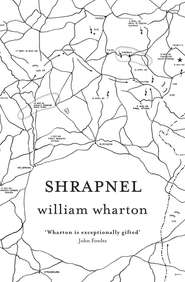По всем вопросам обращайтесь на: info@litportal.ru
(©) 2003-2024.
✖
Tidings
Автор
Год написания книги
2018
Настройки чтения
Размер шрифта
Высота строк
Поля
Unfortunately, one needs to turn off a heater in the main room before one turns on the toilet heater, or a fuse will blow. There’s only fifteen amps of 220 volts coming into the mill. This is mostly a summer place for us.
The flushing system is much too complicated to describe; also ‘less used’ toilet paper is saved to be burned in the fireplace. This is not an energy conservation measure; although, normally, I’m a great energy conserver; could be part of my problem; which seems to be at the base of all our problems. It’s just that our septic tank can only handle so much; it’s almost thirteen years old now.
I trim and arrange my holly in vases. Then cook up for myself a quick meal with cassoulet from a can. I soak this up with bread, wash it down with red wine. When I’m alone, that’s about the extent of my culinary effort.
Next, I’ll be going out to cut a few branches from a nearby planted pine forest. This part requires the total darkness now upon us. The past twelve years we’ve stolen our whole celebration Christmas tree from this forest. Daytime, we’d hunt till we’d found the perfect tree, then mark it. In the night we’d sneak out, saw at ground level, cover the stump with dirt, drag our tree from the forest, through this sleeping town, and into our mill. There’s nothing quite so soul-satisfying as a stolen Christmas tree.
In general, it’s a good trick putting together the precepts of Christianity with the ordinary American way of celebrating Christmas. It’s even more difficult with our particular family celebrations. We concentrate on the fantasy, the wonderful drama of Santa Claus and Christmas tree; yule log and gift giving, emphasis on star, snow and domestic animals; pure paganism. And, to top it all off, we steal our Christmas tree.
But now those trees, our old Christmas trees, in this planted forest, are tall and thick around as telephone poles. No one in the family will help me with the cutting, sawing, dragging home and hiding. That wonderful forest outgrew us. So, this year, we’ll probably be reduced to buying our tree in Nevers. We’ll be there, with hordes of others, pawing through tree cadavers looking for just the right size, and fullness.
I dress in my duffle coat and woolen hat again, pick up the saw and flashlight, drop down through our trap door carefully feeling in the dark with my feet. Before I’m even in the cellar, I’m met by a breathtaking blast of cold. I know cold air can’t flow up. Maybe the molecules are so cramped in this freezer of a cellar they’re forced up by sheer pressure of numbers into the light, airy, open space of the warm upstairs room. I pull shut the loose, swinging, hingeless trap door, stumble down the last steps and walk out into the blackness of night. There should be a crescent piece of moon up there somewhere, I think, but I move in virtual total blindness.
Does the road seem to glow? I don’t know if the paleness I see is wet road or only something I want to see. The mind is a powerful force. I feel the hard surface through my rubber boots so I should sense if I wander left or right off the road. I can always flash my light, but then I lose what little night vision I have. Also, I don’t want the villagers to know I’m out stealing pine branches.
Ahead is a halo around our next town, a ghostly haze of whiteness fills the misty air from the single town street lamp. I watch as forms loom out of the all-surrounding gloom. The light creates visions different from ordinary daylight scenes; it’s like snow, muffling, at the same time defining new shapes. I stare, entranced, at stone buildings standing bare in the night.
I pass through the other side of this light and my shadow stretches ahead. I finger my flashlight briefly walking along, waiting for the road to curve. At the turn I step off into the forest, wading through broken branches. They’re so rotted, so damp, they don’t crack when I step on them.
I begin cutting pine branches with my small handsaw till both arms are full. I stumble out onto the road, and scurry downhill through the dark wet air, back to my nest.
Inside, I take off my coat and hat, staple my branches across beams and over windows to hide those staples in the drapes.
Tomorrow I’ll drive into Nevers to pick up Loretta and Ben. They’re taking the seven A.M. train down from Paris. We’ll do our Christmas and food shopping there in Nevers then come back here to the mill. I hope we can make the trip home before dark. French country roads at night are treacherous, especially if this weather turns to snow.
The girls and guest arrive the day after tomorrow, Ben’s birthday. Ben was our Christmas surprise baby, born the eve of Christmas Eve. In a certain way, each of our babies was a surprise, a minor miracle. Maybe that’s why Christmas means so much to us.
Next morning, I wake at six. Whorls and swirls of snow spin through the path of my flashlight out our window. The ‘powers that be’ have miscalculated; snow was supposed to hold off at least one more day. So now I’m in for a sixty-kilometer drive in the snow, in the dark; driving a car with no snow tires, no chains, a malfunctioning heater and a driver’s-side window that won’t really close. Also, there’s no third gear on this four-speed, all slow, car, and the clutch started slipping irrevocably on the way from Paris. Fancy new sports car, my car is not.
Then again, perhaps I won’t need to drive my wreck to Nevers. The battery has been failing. There are white encrustations on the zinc plates when I look through its translucent sides. Maybe if I shake it I’ll have a miniature snowstorm in there, the way it snowed with the tip-toys I loved so when a child.
As a precaution, I brought down my battery charger. This is based upon several frustrating, Herculean, early morning efforts in Paris. Ben and I pushing the car with Loretta steering; she throwing it into gear then chug-churring down to nothingness. Finally, we’d have a frantic dashing off to the metro, book bags flying, tempers fraying, while I’d unhook the dead battery, haul it upstairs to the apartment and charge it. Gradually, morning’s cold grip would let up some and after two hours’ dialysis, I’d reinstall the battery and drive off to my ten-o’clock class. Normally, Loretta and Ben drive the car while I take the metro.
So now I dress hurriedly in the clothes I’d set out on a chair the night before. I pull on gloves and hat, check my flashlight, lower myself carefully through the trap door into our granite tomb of a cellar. Mill machinery looms mute and massive in the dense molecule-packed darkness. I press the door latch, go up the few stone steps into wild, twisting whiteness. The street already has four inches of fresh, untrammeled snow. Icicles hang over the opening to our lower grange where I keep our car. Inside spread the remains of at least six motorbikes surrounding our car like an escort. These represent Mike’s progress from 50-cc pedal bikes to his current 500-cc love. Here in dusty, rusting machinery is revealed the remnants of one man’s personal passage through mechanized puberty displacement.
In the car, I check that the lights and heater fan are off before turning the key. I pull the choke out a finger length, press down hard on the accelerator slowly, twice, following carefully the instructions of the man from whom I bought this car, a Mr Diamant.
Then I turn the key. The starter motor sings in merry glee: ‘Here we go! Here we go! Here we go!’ The engine remains stone deaf (maybe that’s steel deaf), hearing nothing, not responding.
I switch off, wait, in quietly surging panic, despair. I try again. Again: ‘Here we go! Here we go!’ But we don’t.
I jam the accelerator once more to the floorboards, against Mr Diamant’s explicit instructions.
This starter motor has no working relationship with the engine, lives a liberated, futile life of its own. Or maybe it’s the engine’s fault; it might not want to be turned on by this particular little starter motor. Gradually we move from ‘Here we go!’ to ‘I’m not making it’ to ‘I can’t make it’ to ‘I give up, quit’, the last in the slurred, tired tones of a staggering drunk or perennially discouraged lover.
I’m ready to quit myself; at the same time my mind’s spinning. I have an hour to recharge the battery. I’ll move the new butane heater down here in the grange to heat the car. I also have jumper cables. Maybe I’ll wait till Philippe, our neighbor, gets up, then cable-jump from his battery.
I give it one more turnover and there’s an embarrassed sniggle from the motor, a flirting response, a hobbling hopscotch skipping of almost going, then nothing.
I wait two full minutes in the dark, exercising my pagan excuse for prayer; creating appropriate expletives against fate, humbling myself with beseechments and benedictions to the engine. I promise I’ll give it an oil change a thousand kilometers early; I’ll give it winter oil, maybe even have the transmission repaired.
No, that doesn’t make sense, it’d cost more than the value of the car. I suppress for a moment the treacherous, wonderful, obvious truth; I’m going to junk this car and get another. In fact, I’m already courting several possibilities.
Get thee from me, Satan!
I clear my mind. I twist the key as if it’s a July day and this is a new car. It turns over, starts, roars, before I even hear the starter motor! What’s the secret? I sit there in the dark, glowing, floating, freezing, listening, as all four cylinders begin to synchronize, mutually warming each other. I pull back the throttle and climb out to swing open the huge grange doors before I asphyxiate myself with carbon monoxide. It’d probably go down as just another unexpected Christmas suicide.
‘None of us noticed anything, but then he was always secretive. It was hard getting close to him, even his wife was very reserved. Philosophers are a weird bunch. You know, he wasn’t even sure the world was real. Can you imagine that?’
Now I leave the car running, my effort at Christmas suicide self-aborted. I dash back through our cellar to the still warm room. I make the bed, unplug the transformer for our American electric blanket, quickly brush my teeth, wash up; listening, always listening, to hear if the car’s still running. I clean out the fireplace ashes, body warm; set up twists of paper, faggots, thin twigs, dry branches, all overlaid carefully with two split logs for an easy fire start when we get back. I’m listening; the car’s still running.
I leave matches by the fire, turn the butane heater down to minimum; butane bottles cost seventy-eight francs each and it means a five-mile drive into Chatin to buy them. I check wallet, checkbook, car papers. I pack expansion wrench, screwdriver, pliers. I pick up a coal scoop in case I get stuck in the snow. I’ll shovel gravel under my wheels from the piles along the road, if I can find gravel under snow in the dark.
I’m ready as I’ll ever be. I leave the single light on over our table. I hate leaving; it all looks, feels, so cozy, just right for a long winter’s day before a fire, sipping frozen vodka, thinking, pondering, speculating along my usual well-worn tracks; what’s it all about? Why am I here? How can one actually know anything? What would make Lor happy? I think I know, but am I really ready? Boy, the heart and the mind are hard to compromise. Just what the hell is love? How much of it is respect, admiration, how much passion? How can I hold it together, or keep it apart? One or the other.
Down in the grange, my car’s still purring. There’s even some interior heat. I push in both choke and throttle. At the entrance to our grange, outside the door, just under snow, it’s deep frozen mud. In reverse, I power my way out and onto the road, frontwheel-drive spinning. I brake skiddingly, stop just before crashing into Madame Le Moine’s snow-bedecked blackberry patch, where the old stable used to be.
I get out, and, from inside, close the large interlocking grange doors, pull down and engage a huge hasp; there’s a small hobbit kind of hatchway cut in the left door for mere humans. I go out, pull the latch to, and step out softly, trying, ineffectively, to avoid cracking through the new snow and thin ice into thick mud.
The first two kilometers of my journey will be the test. Since we are at the bottom of a bowl into which three streams flow forming the mill pond, there is no way out but up, rather steeply up. In each direction there’s an unrelenting slope of at least two kilometers. Summer jogging here calls for a reserve of foolhardy courage.
I’m back in the car, auto heater more or less keeping ahead of steam condensation, snow and ice on the windshield slowly melting. I lean out and brush the side-view mirror; look at my watch. It’s seven ten. They’ll arrive two hours from now; I’m obviously postponing the obvious. I force the clutch, get into unsynchronized first, then start grinding up the steep hill to Vauchot.
I make it fine up the first tough pitch, the part where I enjoy making my brave downhill finishing sprint, summers. I stay in first, rounding the banked curve, past where Monsieur Pinson has a gate to his lower field. The back end of my car tends to veer left and right samba-style.
I slalom up the hill, knowing if I stop I’ll never make it. Finally, I arrive at the top in Vauchot. It should be really exciting going downhill.
I glide-slide through Vauchot.
Now there’s a long curving downgrade twisting toward the town of Corbeau. Going up this hill on a motorcycle is where our Mike would practice speed-shifting while slanting his machine at a forty-five-degree angle to the ground. That desert trip of Mike’s begins to seem like a quiet, sane and peaceful way to spend Christmas.
I stay in first gear. The car slips twice but holds and I’m on the straight stretch to Corbeau. I shift up to second for the first time. The next ten kilometers are twisting ascending and descending curves but none worse than the five I’ve just negotiated. I begin to hope I shall actually make it to Nevers; never-never land of the Bourgogne.
The first light is beginning to glow gray through the falling white when I intersect Route Nationale 978 toward Nevers. I see that, on this well-traveled road, the snow has been squeezed to slush on the sides so the dark road surface is visible. I ease out carefully, speed-shift from second to fourth, past that nonexistent third, switch my lights to low, fight down the window and wipe off my side-view mirror. The rear window is fogged from the steam of anxiety.
The French have a bumper sticker saying AU VOLANT LA VUE C’EST LA VIE. I was never sure if it meant ‘While stealing, visibility can mean your life’, or ‘While driving (actually steering) vision is life’, This gives some idea of my high-quality French. Even though I did my master’s thesis on Albert Camus’ concept of ‘cherish your illusions’, my French is weak, to say the least.
I wrestle my window up again to half-mast and wipe mist from the windshield. The snow seems to be slowing down some. I sneak a peek at my watch in the rising light. I have almost an hour left and only forty-five kilometers to go.
It’s five till nine when I roll through Nevers. The medieval stone buildings, crisscrossed with half-timber wooden beams, lean over narrow cobbled roads. I work my way to the train station; park and check the station clock. I’m fifteen minutes early, my watch is five minutes fast.
I go into the station restaurant; order a black coffee and a croissant at the bar. I pay and sit down at a table. There’s clatter all around me as a French boys’ school group, wearing school ties and school jackets, struggles with skis and ski equipment, preparing to board the train from which I hope to see Loretta and Ben descend.
The smell of my coffee, the first sip, sends me on a search for the restaurant toilet. I find it, a shared sink and mirror with separate bisex johns. It’s a sitter not a squatter. There’s no light and I assume it’s one of those French logique affairs where the light comes on when you turn the latch. There is the right kind of latch but when I turn it tight nothing happens. I reopen the door to locate: seat, toilet paper, flusher (chain), paper (individual-sheet, slippery). I grab a handful of the paper, get all my angles, vectors and locations set, then prepare to shut the door.
A woman in a fur coat comes out from the other john and is fluffing her well-cut hair. I wonder if there’s a light in that one, consider dashing in behind her, instead, elect for gallantry, maybe modesty, close my door and settle down in the dark.
When I’m finished, after some dark fumbling with buttons, hooks, snaps, I grope for the latch. I’m wearing long johns over regular underwear, then black ski pants, two long-sleeved undershirts, one waffled, guaranteed against Arctic cold (but not too effective against Morvanic), a sweater and my jacket. I never do quite manage my jacket zipper in the dark.











